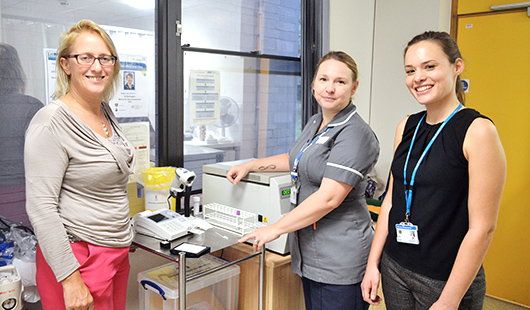Media Release
Date: 7 October 2019
RUH leads the way in ground-breaking test for pre-eclampsia
Pregnant women can now find out earlier if they are at risk of developing potentially life-threatening pre-eclampsia thanks to a new blood test which is being used at the Royal United Hospitals Bath NHS Foundation Trust.
The Trust is one of the first in the country to use the new test, which measures the levels of a protein made by the placenta, called placental growth factor (PlGF).

Studies have shown that women with very low levels of PlGF are more likely to develop severe pre-eclampsia and require treatment, which may include the need to give birth early.
This new test will allow women at risk to be monitored appropriately and improve outcomes for both mothers and babies.
The project has been led at the RUH by Research Midwife Mel Rich alongside Point of Testing Coordinator Nicola Hodges.
Mel said: "This test is a game-changer in how we assess women who are suspected of developing pre-eclampsia. It means we can identify women at risk much more quickly than before and make sure they get the support they need as early as possible.
"The test is quick and easy to do and our maternity staff can use the new equipment in the department, so the blood sample doesn't have to go to the lab.
"So far, we are one of just a handful of hospitals using this equipment, which shows the RUH is once again helping to drive innovation which improves the care of our patients."
Pre-eclampsia is a condition that affects some pregnant women, usually during the second half of pregnancy (from around 20 weeks) or soon after their baby is born.
It is diagnosed through a combination of hypertension (raised blood pressure) and proteinuria in pregnancy (the presence of protein in urine) but as it involves many systems in the body it can present in many different ways, which can make it difficult to diagnose.
Up to 6% of UK pregnancies will be affected by pre-eclampsia. Most cases are mild and may have no effect on the pregnancy. However, if left untreated, pre-eclampsia can be dangerous for both mother and baby.
Pre-eclampsia can potentially progress to a more dangerous condition known as eclampsia, which can cause fits or convulsions. In severe cases, eclampsia can sometimes cause the death of the mother or the baby.
The new blood testing equipment now in use at the RUH is being funded by NHS England for a year, as part of their Innovation Technology Payment initiative. The funding award is the result of the RUH's involvement in a successful national study, which investigated the clinical use of the new blood test.
Clare Evans, Head of Adoption and Spread for the West of England Academic Health Science Network (AHSN), said: "The West of England AHSN is really pleased to work with the RUH to implement this new diagnostic test. It's great to see the Innovation Technology Payment initiative enabling improvements to inpatient care."
ENDS
Notes to Editor
- The Royal United Hospitals Bath NHS Foundation Trust provides acute treatment and care for a catchment population of around 500,000 people in Bath, and the surrounding towns and villages in North East Somerset and Western Wiltshire. The hospital provides healthcare to the population served by four Clinical Commissioning Groups: Bath & North East Somerset CCG, Wiltshire CCG, Somerset CCG and South Gloucestershire CCG.
- The Trust has 759 beds and a comprehensive range of acute services including medicine and surgery, services for women and children, accident and emergency services, and diagnostic and clinical support services.
- In 2015 The Royal United Hospitals NHS Foundation Trust acquired the Royal National Hospital for Rheumatic Diseases (RNHRD) NHS Foundation Trust. The RNHRD treats patients from across the country offering services in rheumatology, chronic pain, chronic fatigue syndrome/ME, cancer related fatigue and fatigue linked to other long term conditions such as multiple sclerosis.
- The RUH is changing - we have an exciting programme of redevelopment underway transforming our site and further improving the services we provide. The Trust has opened the purpose-built RNHRD and Brownsword Therapies Centre and is now working towards the new Dyson Cancer Centre. For more details visit: www.ruh.nhs.uk/fit4future

